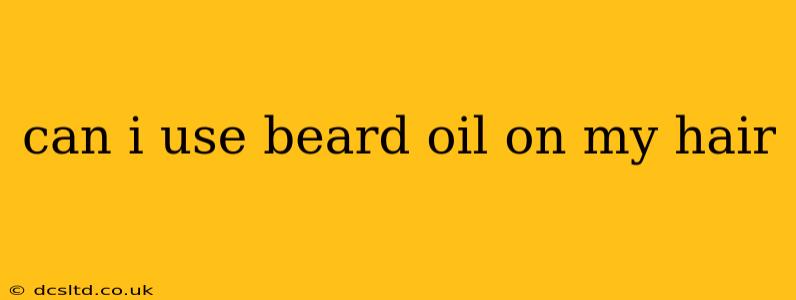Can I Use Beard Oil on My Hair? Exploring the Possibilities
The question of whether beard oil can be used on hair is a common one, and the answer isn't a simple yes or no. While it's not a direct replacement for hair products specifically formulated for scalp and hair, beard oil can offer some benefits, but it also comes with potential drawbacks. Let's delve into the details.
What are the benefits of using beard oil on hair?
Beard oil is typically formulated with natural oils like argan oil, jojoba oil, and others, known for their moisturizing and conditioning properties. These oils can help to:
-
Soften and condition: If your hair is dry, brittle, or prone to frizz, the moisturizing properties of beard oil can help to improve its texture, making it feel softer and more manageable. This is particularly beneficial for those with coarse or curly hair.
-
Add shine: The oils in beard oil can add a healthy sheen to your hair, making it look more vibrant and lustrous.
-
Reduce frizz: The oils can help to smooth down flyaways and frizz, resulting in a sleeker look.
-
Improve manageability: For those with unruly hair, beard oil can help to tame it, making it easier to style.
What are the potential drawbacks of using beard oil on hair?
While beard oil can offer benefits, it's important to be aware of some potential drawbacks:
-
Weighting down hair: Beard oil, designed for thicker beard hair, can be too heavy for some hair types, leading to limp or greasy hair. This is especially true for those with fine or thin hair.
-
Build-up: Depending on the formulation and frequency of use, beard oil can build up on the scalp, potentially leading to clogged pores and scalp irritation.
-
Not formulated for the scalp: Unlike hair products, beard oil isn't specifically designed to address scalp concerns like dandruff or dryness. Using it on the scalp might not provide the necessary benefits for these issues and could even exacerbate them.
-
Potential for scent clashes: Beard oil often contains strong scents that might clash with your existing hair products or personal preferences.
What types of hair might benefit from beard oil?
Beard oil might be a suitable addition to your hair care routine if you have:
-
Dry, coarse, or curly hair: The moisturizing and conditioning properties can help to improve the texture and manageability of these hair types.
-
Hair prone to frizz: The oils in beard oil can help to tame frizz and add shine.
What types of hair should avoid using beard oil?
Individuals with the following hair types should likely avoid using beard oil:
-
Fine or thin hair: Beard oil's heavy consistency could weigh down fine hair, making it look limp and greasy.
-
Oily hair or scalp: Adding more oil to already oily hair will only exacerbate the problem.
How to use beard oil on hair (if you choose to):
If you decide to experiment with beard oil on your hair, start with a small amount and apply it sparingly to the ends of your hair, avoiding the scalp. Focus on the areas that need the most moisture and conditioning. Too much can lead to buildup and a greasy look.
Is beard oil the same as hair oil?
No, beard oil and hair oil are not the same. While they may share some similar ingredients, they are formulated differently to address the specific needs of beard hair versus scalp and hair. Hair oils are often lighter and designed for absorption into the scalp, whereas beard oils are often thicker and designed to coat and condition the beard.
In conclusion, using beard oil on your hair can offer certain benefits, but it's crucial to understand your hair type and potential drawbacks before incorporating it into your routine. A small test patch is always recommended to see how your hair reacts. If you have concerns about using beard oil on your hair, consulting a hair stylist or dermatologist is advisable.
